Far From Bashar
Pascal Sanchez
2020
| 73 min
A few years ago, the al-Mahamids fled Bashar al-Assad and Syria to settle in Montreal. A nuanced portrayal of a courageous family coping with a seemingly interminable war, thousands of kilometres away, that continues to affect their lives.
Several years ago, after taking part in the mass uprisings against Bashar al-Assad, Adnan al-Mahamid had to flee Syria with his wife, Basmah, and their four children. Now settled in Montreal, the family opens their door to filmmaker Pascal Sanchez. They’ve adjusted to life in a peaceful city, but Adnan and Basmah still fear for loved ones back in Syria whose status and whereabouts remain unknown. The war that’s thousands of kilometres away continues to haunt them, surging suddenly to the fore in a conversation, Skype call or Facebook feed. Far from Bashar chronicles an endearing family as they go about their lives, tormented by a distant and seemingly interminable conflict.
About the film
Adnan al-Mahamid, his wife, Basmah, and their four children fled the Syrian city of Daraa for Canada in October 2014. An engineer and ardent pro-democracy activist, Adnan took part in the mass uprisings against Bashar al-Assad. But his desire for freedom came at a heavy price as the regime came down hard on him and many of his friends, arresting or abducting them. Fearing for their lives, the family embarked on the long road of exile before eventually settling in Montreal.
The film opens on a sombre anniversary as Adnan painfully relives his arrest and incarceration, events that took place three years ago to the day. “It hangs like a curse over those who have survived it,” he says.
As 15-year-old Basel, 14-year-old Raniah, 10-year-old Saja and 4-year-old Ali quickly take to life in a peaceful city, making friends with the kids at their local school, Adnan and Basmah fear for loved ones back in Syria whose status and whereabouts are unknown.
After a few years living far from Bashar al-Assad, how does one go about reconciling a new life with wartime trauma? Adnan perfects his English as he studies social work at McGill University; Basmah learns French as she keeps on top of developments back home. The kids are in an immigrant entry class, effortlessly switching from English to French to Arabic. At the apartment, the war in Syria is both distant and vividly present, surging suddenly to the fore through a conversation, Skype call or Facebook feed.
The family generously opened their door to filmmaker Pascal Sanchez. Built around close observations of their daily lives paired with an exploration of Adnan’s social media posts, Far from Bashar chronicles an endearing household tormented by a conflict whose end is, alas, nowhere in sight.
To date, the Syrian war has claimed more than 350,000 lives, with at least 50,000 more people “forcibly disappeared” or detained by the regime. Capturing the apparent ordinariness of life today for the al-Mahamids, Sanchez’s documentary is a moving testimonial to the love that unites them and from which they draw the strength to go on, far from Bashar.
Director statement
I first imagined Far from Bashar as the daydream of a Syrian child who’s been plunged into new surroundings, haunted by the war he’s just left and eager to embrace the life he’s just begun. I wanted to make a film about thought. To film thought as if it were an actual landscape, full of people, animals, flowers and trees. At a time when Canada was still largely closed off to refugees, I began looking for such a child in Montreal. I asked around endlessly. At long last, I met the al-Mahamids: Adnan, Basmah and their children, Ali, Basel, Raniah and Saja.
I was struck by their story. In particular, by the militant Adnan, his experience both in Syria and here in Montreal, his social commitment, his faith in tomorrow. I also noted the resilience of the kids, their liveliness, their desire to be here. I saw the presence and courage of their mother, Basmah. This family, I sensed, could help my fledgling ideas take shape. Because I saw in them something of myself.
The project got quickly underway. They opened their doors to me, invited me into their home. Since I don’t speak Arabic, I often filmed with little idea as to what was being said, relying instead on body language and affectionate gestures. I captured Raniah at school with her brother Basel, going full speed ahead with their lives. Saja would watch her parents closely, becoming the documentarian’s alter ego, in a way. The family’s apartment was bursting with life. But there was also tremendous vulnerability, pain, a terrible fear for loved ones left behind. I told myself we know nothing about this war—that our ignorance was downright obscene. That the repressive regime was hideously, incredibly violent. And this was something the al-Mahamids had to cope with daily as they struggled to build their new lives. In filming them, I wanted to pay tribute to their courage, humanity and immense love for one another.
There were days when the suffering refused to be ignored, would come surging back into the present. Adnan would relive his arrest and incarceration, the pain of each moment springing vividly to life. These days from the past would fill the air. We talked about it. The scene that starts the film is one such day. Adnan, improvising, softly addresses Ala, a friend of his who’s still in prison. He mentions his brothers. His words are beautiful, profound. He also shares his writing with me. When I ask him why he agreed to be filmed, he answers: “Because we are good people.” I understood, then, that he was alluding to the racism and stereotypes his family must cope with at every turn. If they opened their door to me, it was also to change these perceptions.
Far from Bashar won’t change the course of the war in Syria. It may, however, succeed in making some of us a little more open to those affected by it.
Trailer
Team
Pascal Sanchez
Director
Photo
Nathalie Cloutier
Producer and Executive Producer, NFB
Photo
Photo : Valérie Sangin
Images
Loading...
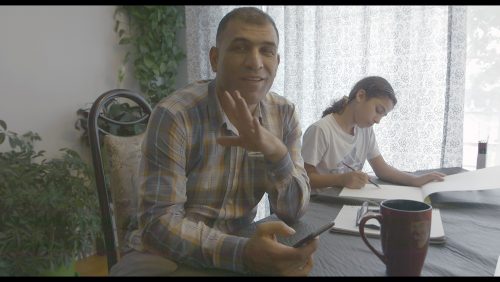
Download
Loading...
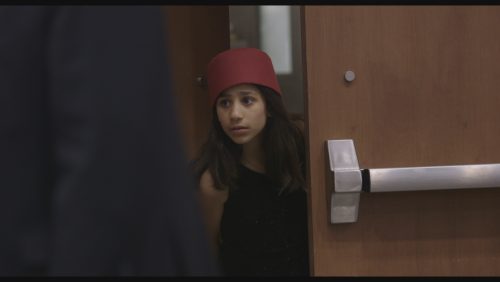
Download
Loading...
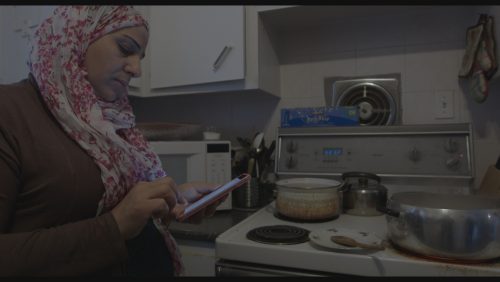
Download
Loading...
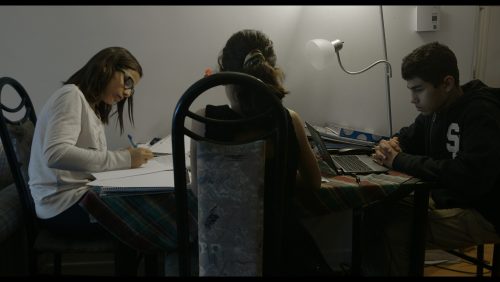
Download
Loading...
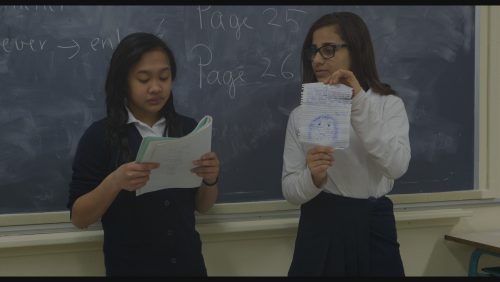
Download
Loading...
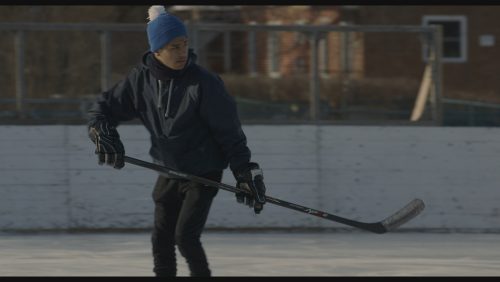
Download
Loading...
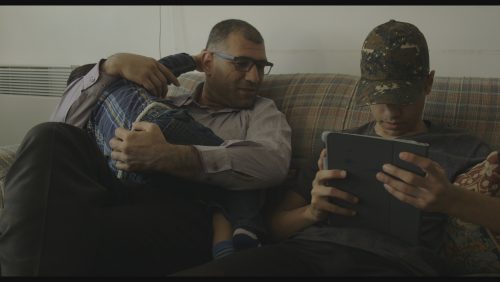
Download
Loading...
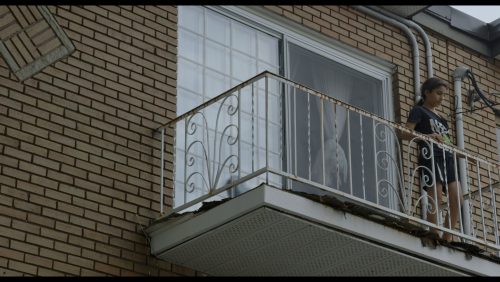
Download
Loading...
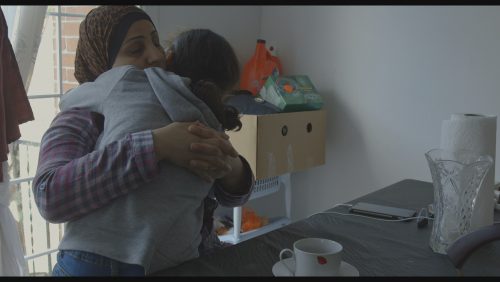
Download
Loading...
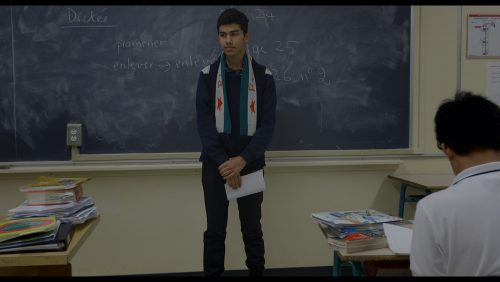
Download
Loading...
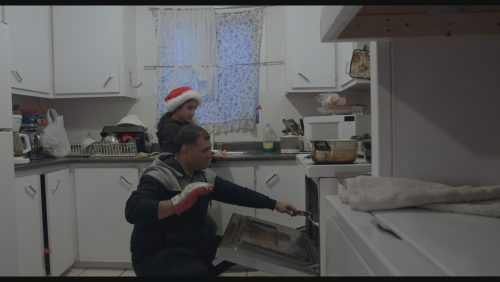
Download
Loading...
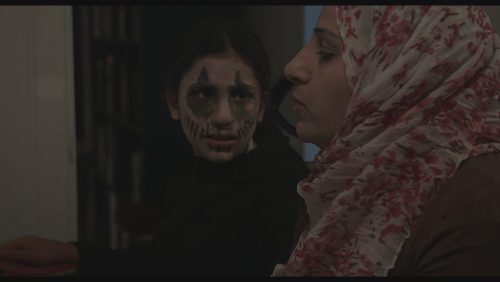
Download
Loading...
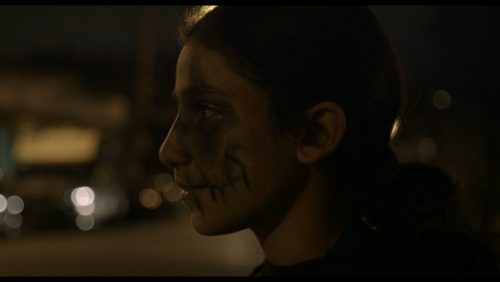
Download
Loading...
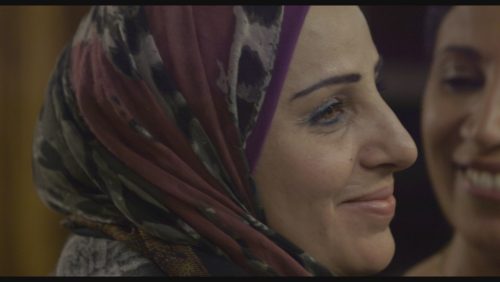
Download
Loading...
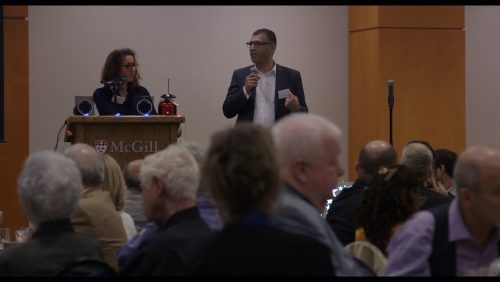
Download
Credits
With
Adnan al-Mahamid
Basmah Issa
Ali, Saja, Raniah and Basel al-Mahamid
Producer
Nathalie Cloutier
Executive Producer
Colette Loumède
Editing
Natalie Lamoureux
Original Music
Serge Nakauchi Pelletier
Sound Design
Mélanie Gauthier
Research, Script and Cinematography
Pascal Sanchez
Production Managers
Tobie Fraser
Geneviève Thibert
Additional Sound Recording
Simon Plouffe
Lynne Trépanier
Daniel Fontaine-Bégin
Production Assistants
Will Prosper
Giulia Frati
Technical Consultant – Camera
Steve Hallé
Technical Support – Editing
Pierre Dupont
Isabelle Painchaud
Patrick Trahan
Assistant Editor
Philippe Lefebvre
Assistant Sound Editor and Additional Sound Design
Sandy Pinteus
Translation
Kamel Bouzeboudjen
Khaled Suleyman
Joulnar El Husseini
MELS
Titles
Mélanie Bouchard
Online Editing
Yannick Carrier
Voices
Suliman Ataya
Meriem Achour Bouakkaz
Foley
Alexis Farand
Foley Recording
Geoffrey Mitchell
Re-recording
Jean Paul Vialard
With
Yves Gauthier
Hilda Eddé Debbané
Kate Gwyneth Suganob
Ace Rondez
Scarlett Brito
Amal Elsana Alh’jooj
Marisa Samek
Adan Alh’jooj
Nico Trocmé
Nilly Elwakele
Additional Voice
Anna Sanchez
Audio Archives
United Nations
Legal Advisor
Christian Pitchen
Press Relations
Nadine Viau
Marketing Manager
Judith Lessard-Bérubé
Marketing Coordinator
Jolène Lessard
Administrator
Sia Koukoulas
Studio Coordinator
Pascale Savoie-Brideau
Production Coordinators
Chinda Phommarinh
Isabelle Limoges
Gabrielle Dupont
Technical Coordinators
Mira Mailhot
Daniel Claveau
Line Producer
Mélanie Lasnier
French Program – Documentary Studio
A National Film Board of Canada production
Media Relations
-
About the NFB
For more than 80 years, the National Film Board of Canada (NFB) has produced, distributed and preserved those stories, which now form a vast audiovisual collection—an important part of our cultural heritage that represents all Canadians.
To tell these stories, the NFB works with filmmakers of all ages and backgrounds, from across the country. It harnesses their creativity to produce relevant and groundbreaking content for curious, engaged and diverse audiences. The NFB also collaborates with industry experts to foster innovation in every aspect of storytelling, from formats to distribution models.
Every year, another 50 or so powerful new animated and documentary films are added to the NFB’s extensive collection of more than 14,000 titles, half of which are available to watch for free on nfb.ca.
Through its mandate, its stature and its productions, the NFB contributes to Canada’s cultural identity and is helping to build the Canada of tomorrow.